#morgoth's ring
Text
Please read this Morgoth's Ring quote with me cuz this is PEAK Fëanor and Fingolfin angst potential:
[[This is Finwë talking to the Valar about Indis]] "But Indis parted from me without death. I had not seen her for many years, and when the Marrer smote me I was alone. She hath dear children to comfort her, and her love, I deem, is now most for Ingoldo. His father she may miss; but not the father of Fëanáro!"
Those familiar with only the Shibboleth's list of quenya names might assume that this is referencing Finarfin, but no. At this point in the story, Ingoldo was Fingolfin's mother-name. This quote implies that, according to Finwë's observations, Fingolfin was Indis's favorite child.
SO IMAGINE; Fëanor, who loves his mother so dearly and so desperately, but never knew her, and therefore never felt her love in return, looking at Fingolfin, who gets the favoritism and motherly love that he craves yet never got. Imagine how jealous and furious that might make him, especially since he hates Indis so much. I can't help but wonder if Fingolfin's being his mother's pride and joy was one of the reasons why Fëanor seemed to hate him the most of his half-siblings.
342 notes
·
View notes
Text
“Sauron had never reached this stage of nihilistic madness [as Morgoth]. He did not object to the existence of the world, so long as he could do what he liked with it. He still had the relics of positive purposes, that descended from the good of the nature in which he began: it had been his virtue (and therefore also the cause of his fall, and of his relapse) that he loved order and co-ordination, and disliked all confusion and wasteful friction.”
— J.R.R. Tolkien, The History of Middle-earth, Vol. 10, Morgoth's Ring
This passage is very crucial to understanding the idea of a repentant Sauron. Tolkien openly admits that Sauron fell from grace, went back to his goodness, and then fell again. The phrase “and therefore also the cause of his fall, and of his relapse” points out that Sauron didn't just fall once and stayed there. He attempted to rise above his crimes after the fall of Morgoth, and for an unaddressed reason, he relapsed and came back to them later on.
Tolkien said it first, folks. Relapse is a deterioration after a temporary improvement. You can't relapse without improving first.
#sauron#halbrand#sauron meta#the rings of power#rings of power#trop#j.r.r. tolkien#morgoth's ring#the history of middle earth
512 notes
·
View notes
Text
But the children of Indis shall redress [Feanor's] errors and therefore I am glad they should have being, and Indis hath my love.
-- Miriel on the marriage of Finwe and Indis and the births of their children, Morgoth's Ring, "Laws and Customs Among the Eldar"
128 notes
·
View notes
Text

Why should we love you, and why should ye love us (if ye do), and yet set the gulf between?
#words by tolkien#the silmarillion#athrabeth finrod ah andreth#andreth#aegnor#history of middle earth#morgoth's ring#tolkien#silmarillion#my art
111 notes
·
View notes
Text
See here's a funny thing about Melkor. A lot of male characters stand up to him and have their victories against him, but he has no chance whatsoever against the ladies. Examples include: Lúthien putting him to sleep, Arien being too scary to approach and the alternate version of the legendarium where Varda is the keeper of the Primeval Light
88 notes
·
View notes
Text
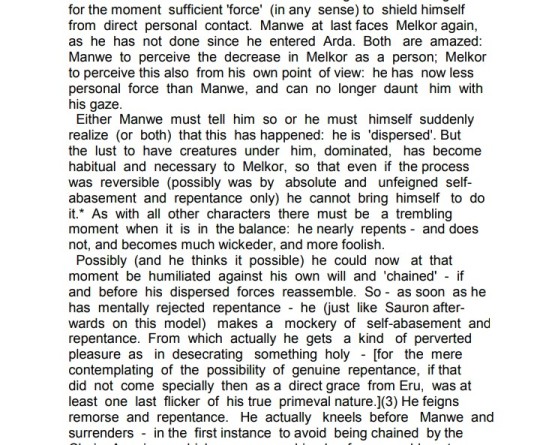
Manwë finally seeing Melkor again after so long only to find him so terrifyingly weak and hollow compared to his past self and Melkor coming to the same horrifying realization at the same time is spinning around in my brain at breakneck speeds.
36 notes
·
View notes
Note
Is Fingolfin close in age to Feanor, or is he closer to Maedhros in age?
Ages of Fëanor, Fingolfin, and Maedhros
All we know for sure if that Maedhros is younger than Fingolfin, since he says this when he waives his claim to the kingship of the Noldor:
"If there lay no grievance between us, lord, still the kingship would rightly come to you, the eldest here of the house of Finwë, and not the least wise."
Alas, the Annals of Aman (published in Morgoth's Ring) do not give birth years for any of Fëanor's children.
They do give birth years of Fëanor (YT 1169) and Fingolfin (YT 1190). Only 21 Valian Years apart![1]
[1] Another essay in Morgoth's Ring (XI in 'Myths Transformed') confirms that Elves did age on the timescale of Valian Years, which at this stage in the conceptual evolution of the legendarium was equal to 100 "regular" years. With Elves maturing around age fifty (again, at this stage), Fëanor was still a "minor" when Fingolfin was born.
In LaCE, Elven pregnancies last one year, so the soonest Maedhros could be born is YT 1220, making Fingolfin 30 Valian Years older than Maedhros, and 21 Valian Years younger than Fëanor, i.e. closer in age to Fëanor.
We also know that Fëanor wedded Nerdanel "while still in his early youth" (The Silmarillion). According to Laws and Customs among the Eldar, "children were born within a short space of years after their
wedding." Aging scales are complicated in Tolkien's writings (post to come on that, eventually), but, also according to LaCE, Elves married soon after their fiftieth year. If Fëanor was notable for marrying "early", then should we understand that he married before fifty? Could be, but let's say he marries at 50 exactly. That would put his marriage at YT 1219.
If you really wanted to canonically make Fingolfin closer in age to Maedhros than to Fëanor, you would have to push Fëanor's wedding back at least 10 years, to YT 1209, and Maedhros' birth to 1210. We know that Fëanor "grew swiftly" and was generally exceptional in everything, so I don't think that's unreasonable.
This scenario would put 20 years between Maedhros and Fingolfin, and 21 years between Fëanor and Fingolfin. It requires an exceptionally early marriage, exceptionally swift conception, and only results in a one-year difference -- but it is possible.
So, according to the Annals of Aman (the only source we have on the birth years of Fëanor and Fingolfin) and what we are told in the contemporaneous Laws and Customs among the Eldar, it's unlikely, but not impossible, that Fingolfin was closer in age to Maedhros than to Fëanor.
#anon#maedhros#feanor#fingolfin#aging#annals of aman#morgoth's ring#history of middle-earth#laws and customs among the eldar
36 notes
·
View notes
Text
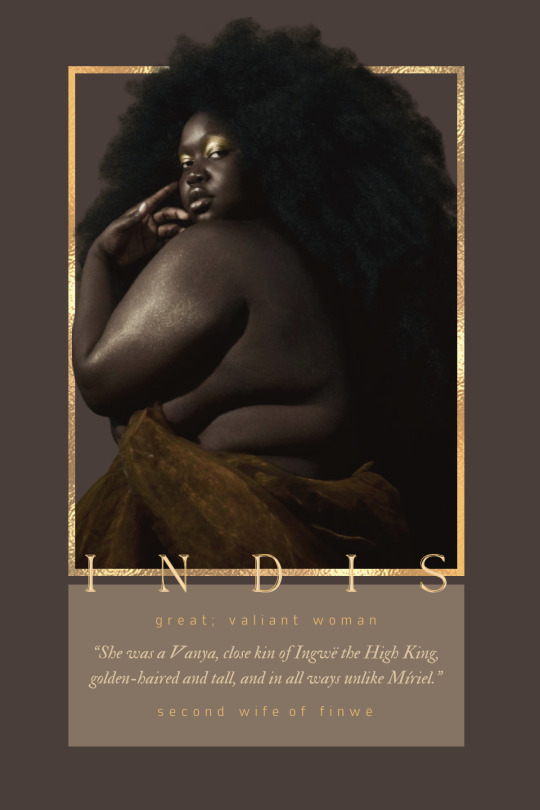
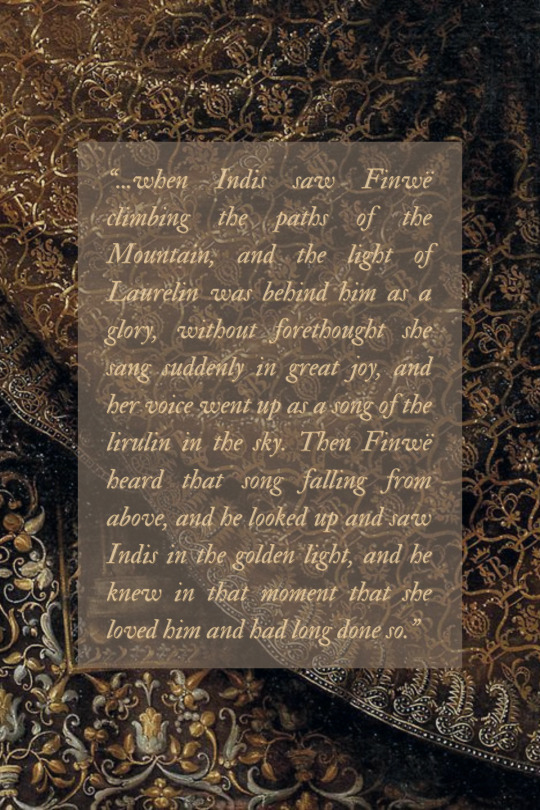

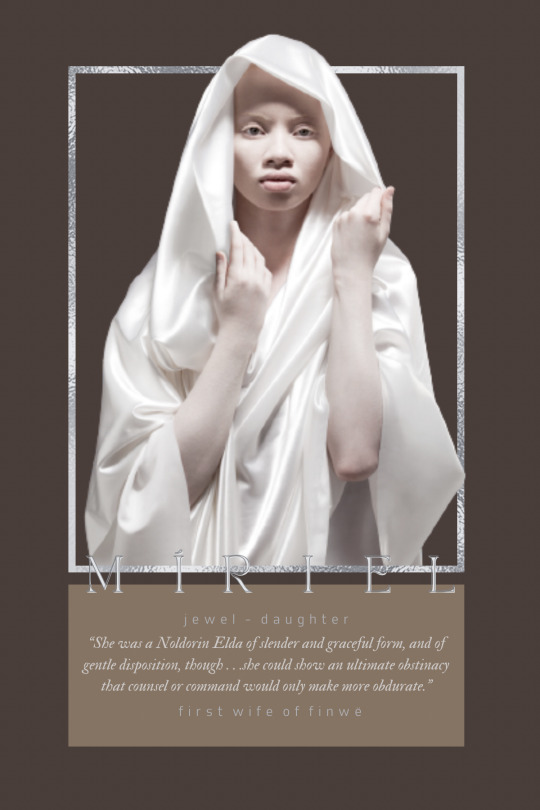
“And when she learned of Finwë all that had befallen since her departure (for she had given no heed to it, nor asked tidings, until then) she was greatly moved; and she said to Finwë in her thought: ‘I erred in leaving thee and our son, or at least in not soon returning after brief repose; for had I done so he might have grown wiser. But the children of Indis shall redress his errors and therefore I am glad they should have being, and Indis hath my love. How should I bear grudge against one who received what I rejected and cherish what I abandoned.’“
- J.R.R. Tolkien, Morgoth's Ring, Laws and Customs Among the Eldar
@finweanladiesweek day 1 » INDIS & MÍRIEL THERINDË
[ID: an edit comprised of four posters in dark and light browns accented with gold and silver.
1: Roseline Lawrence, a ugandan-south sudanese model with dark skin and long coily dark hair. She is plus-size, wearing gold makeup and looking over her shoulder with one hand raised. She is framed by a gold rectangle, with gold text at the bottom reading "indis" in all caps. Below that, text in varying yellow shades reads "great; valiant woman," "second wife of finwë," and "“She was a Vanya, close kin of Ingwë the High King, golden-haired and tall, and in all ways unlike Míriel" / 2: A detail from a painting showing golden embroidered cloth draping down from above. Yellowish-orange text in a transparent brown box reads "“...when Indis saw Finwë climbing the paths of the Mountain, and the light of Laurelin was behind him as a glory, without forethought she sang suddenly in great joy, and her voice went up as a song of the lirulin in the sky. Then Finwë heard that song falling from above, and he looked up and saw Indis in the golden light, and he knew in that moment that she loved him and had long done so" / 3: A detail from a painting showing draped white and silver cloth. Silver text in the same format as Image 2 shows the same passage as the caption of the edit / Thando Hopa, a xhosa-sotho south african woman with albinism. She is looking straight at the viewer and is wrapped in a white robe that falls over her head, though she holds it out of her face. Same format as Image 1, but the frame and text are silver, and the text reads "míriel," "jewel-daughter," "first wife of finwë," and "She was a Noldorin Elda of slender and graceful form, and of gentle disposition, though . . .she could show an ultimate obstinacy that counsel or command would only make more obdurate" /End ID]
#finweanladiesweek#indis#míriel therindë#silmedit#tolkienedit#mepoc#fantasyedit#litedit#tolkiensource#sourcetolkien#oneringnet#the silmarillion#morgoth's ring#the professor's world#brought to you by me#edits with the wild hunt#fc: roseline lawrence#fc: thando hopa#house of finwë#described
69 notes
·
View notes
Text
Melkor indeed declared afterwards that Fëanor had learned much art from him in secret, and had been instructed by him in the greatest of all his works; but he lied in his lust and his envy, for none of the Eldalië ever hated Melkor more than Fëanor son of Finwë, who first named him Morgoth; and snared though he was in the webs of Melkor’s malice against the Valar he held no converse with him and took no counsel from him.
The Silmarillion, Ch. 6 'Of Fëanor and the Unchaining of Melkor'
I think it's so interesting that Fëanor apparently never spoke to Melkor.*
But what I find even more interesting is this passage in 'The Later Quenta Silmarillion (II)':
And lo! Melkor then set new lies abroad, and whispers came to Fëanor that Fingolfin and his sons were planning to usurp the leadership of Finwë and the elder line of Fëanor [etc., more lies]. But to Fingolfin and Finarfin it was said: 'Beware! Small love has the proud son of Míriel ever had for the children of Indis! [etc., more lies].'
It is told also that when Melkor saw that these lies were smouldering he began to speak, first to the sons of Fëanor, and at other times to the sons of Indis, concerning weapons and armour ...
Morgoth's Ring, 'Later QS (II)', §52-52a (p. 276)
This is pretty similar to what's in the published Silm (much of which is closely derived from this text; I'll put the passage below the cut if anyone wants to compare), but the bit about "to the sons of Fëanor" does not appear.
Fëanor refused to listen to Melkor, but Melkor definitely got at him other ways. One might conclude based on the published Silm that his sons were a logical conduit for his lies, but I love that it's stated outright in the Later QS. Juicy.
*Other than, I suppose, the incident when Melkor shows up uninvited and has the door slammed in his face.
Second passage as it appears in the Silmarillion (Ch. 7):
Then Melkor set new lies abroad in Eldamar, and whispers came to Feanor that Fingolfin and his sons were plotting to usurp the leadership of Finwe and of the elder line of Feanor, and to supplant them by the leave of the Valar; for the Valar were ill-pleased that the Silmarils lay in Tirion and were not committed to their keeping. But to Fingolfin and Finarfin it was said: ‘Beware! Small love has the proud son of Miriel ever had for the children of Indis. Now he has become great, and he has his father in his hand. It will not be long before he drives you forth from Tuna!’ And when Melkor saw that these lies were smouldering, and that pride and anger were awake among the Noldor, he spoke to them concerning weapons; and in that time the Noldor began the smithying of swords and axes and spears.
#feanor#morgoth#sons of feanor#meta#quotes#the history of middle-earth#morgoth's ring#working on a Feanor bio so don't be surprised if you see random Feanor musings on this blog between now and November
83 notes
·
View notes
Text
LaCE gets such a bad rep for the whole sex = Elf marriage for all eternity thing that we forget about the section on necromancy 😔
#mentally incorporating this info into my dd fic that i am totally working on...#LaCE#HoME#morgoth's ring
24 notes
·
View notes
Photo
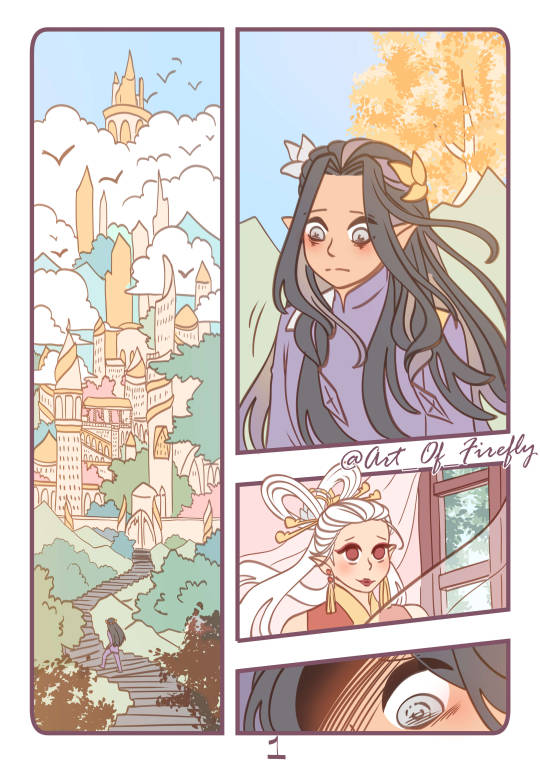
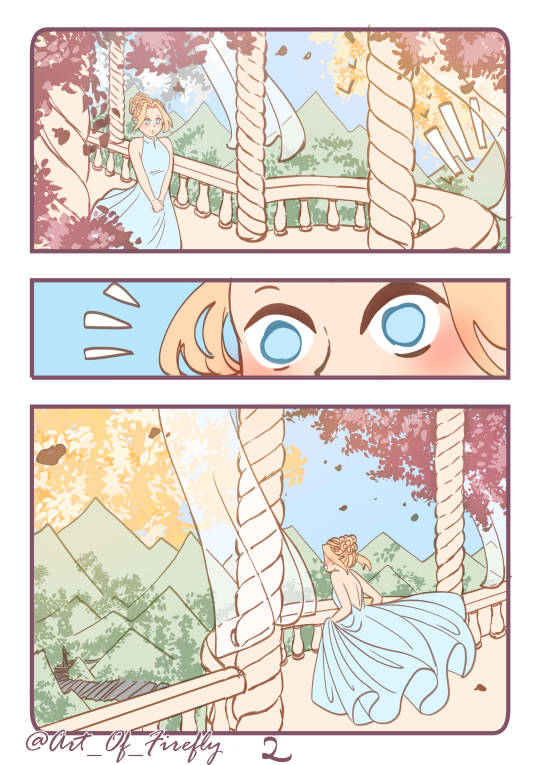

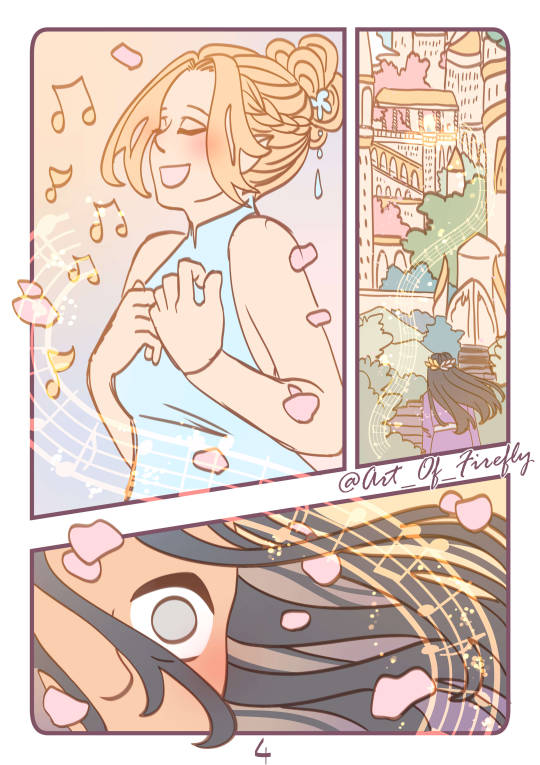

A little comic of the moment when Finwë falls in love with Indis, thanks to the silmarillion daily because I had never paid attention to how adorable this scene was before
It’s only a sketch and not in my usual artstyle but i hope you like it
Edit : For anyone wondering, the scene is from Morgoth’s Ring
#finwe#indis#miriel therinde#silmarillion daily#I have this very precise interpretation of Indis: very calm graceful and elegant etc#some traits she passed on to some of hers descendants like Fingolfin and Galadriel#BUT when it’s about Finwë she just turn into an adorable lovesick puppy#my art#morgoth's ring
281 notes
·
View notes
Note
This is probably a stupid question, but you said you're open to ones about Sauron: do you know what he was doing after Morgoth was defeated the first time? It doesn't make sense that he would be in Valinor, but I see people say that he was. Am I missing something? Thank you
Anon, this is not a stupid question at all and I've also puzzled over where the idea that Sauron was in Valinor after the otherthrow of Utumno came from. From reading the Silm, it really sounds like Sauron defected to Morgoth at a very early point, well before the elves woke up, and did not leave him after Morgoth's defeat.
I guess at a high level, here's the timeline of events:
World is created. Valar arrive.
Melkor decides he want to be king of the world, screw Manwë and Eru.
Tulkas arrives and chases Melkor out. Melkor begins to sulk away from the Valar.
The Valar make the two lamps. Everything is beautiful and nothing hurts.
THEN we get this first information about Sauron (from the Annals of Aman in Morgoth's Ring):
Now Melkor knew of all that was done; for even then he had secret friends and spies among the Maiar whom he had converted to his cause, and of these the chief, as after became known, was Sauron, a great craftsman of the household of Aulë.
So, yeah, Sauron became a follower of Morgoth at a very early point, before the making of the lamps. He also had to have been not aligned with Morgoth exclusively at some point in order to become known as a great craftsman of the household of Aulë.
So when does he leave? I don't know, but I think it's before the elves leave Cuiviénen.
I think it's actually an important plot point that Sauron is out in the world working as an agent of Morgoth after Utumno is overthrown, and crucially Utumno is overthrown because the elves have woken up and the Valar want to defend them but have not yet contacted them. One of the highlights for me in Nature of Middle-earth was all the references that Sauron was causing chaos while Morgoth was in Mandos and then in Valinor. This was already in the Myths Transformed chapter of Morgoth's Ring, but there were even more details in NoME.
Here's Myths Transformed because I don't feel like fishing out NoME (and I think this is more complete and canonical anyway):
We my assume, then, that the idea of breeding the Orcs came from Melkor, not at first maybe so much for the provision of servants or the infantry of his wars of destruction, as for the defilement of the Children and the blasphemous mockery of the designs of Eru. The details of the accomplishment of this wickedness were, however, left mainly to the subtleties of Sauron. in that case the conception in mind of the Orcs may go far back into the night of Melkor's thought, though the beginning of their actual breeding must await the awakening of Men.
When Melkor was made captive, Sauron escaped and lay hid in Middle-earth; and it can in this way be understood how the breeding of the Orcs (no doubt already begun ) went on with increasing speed during the age when the Noldor dwelt in Aman; so that when they returned to Middle-earth they found it already infested with this plague, to the torment of all that dwelt there, Elves or Men or Dwarves. It was Sauron, also, who secretly repaired Angband for the help of his Master when he returned; and there the dark places underground.
So, I think we can conclude Sauron spent time in Valinor during the Age of the Lamps, but was already leaning or completely converted to Melkor's agenda at the time, and he left well before the elves arrived, very possibly before the elves woke up. I am not aware of any information that suggests otherwise, though if anyone has it, I'm happy to hear it.
So I think the many stories of Sauron in Valinor with elves are just playing with the idea and having fun with it, because it is an interesting idea, and not really worrying about the timeline. And I will end on that non-judgmental note!
#Anon you are so sweet and thank you for your other message#you are also smart and clearly understand cause and effect for which 👏#sauron#melkor#years of the lamps#morgoth's ring
22 notes
·
View notes
Text
Elves and Middle-Earth
Okay gather Tolkien nuts, I have a question (I am genuinely curious).
I've seen so many posts about the Nature of Middle Earth excerpt that removing Eldar from Middle-Earth was not Eru's design. Doing so resulted in diminishing elves of Middle-Earth and taking away their guidance from their younger brethren, men.
Now my question is, if Aman was not a part of Iluvatar's plans for elves, why re-shape the world and go on an entire ordeal with the Numenorians? Wouldn't making Arda inaccessible make it harder for elves to return? Why would Eru allow elves to be separated from Middle-Earth later in the legendarium?
What about the Vanyar and Teleri, for whom Aman became a permanent residence and they did not experience the Doom as the Noldor did? Was their connection to Middle-Earth destined to be lesser than the Noldor?
What would have leaving elves in the Middle-Earth have meant for the Halls of Mandos and re-birth? Would the elves who died in Middle-Earth be reborn in Aman as in cannon or would they be reincarnated back to Middle-Earth?
While researching I found another excerpt from Morgoth's Ring-
"For of this summons came
many woes that after befell; yet those who hold that the Valar
erred, thinking rather of the bliss of Valinor than of the Earth,
and seeking to wrest the will of Iluvatar to their own pleasure,
speak with the tongues [read tongue] of Melkor"(P. 162)
Does this excerpt mean that narratives that were said to argue that bringing elves to Valinor had been an error and the Valar's disobedience to the will of Illuvatar were influenced by Melkor? We do hear a similar argument from Feanor who thinks that the Valar are conspiring against the elves by keeping them away from Middle Earth and in return favoring men.
Lastly- if Aman is not THE place for Elves then why do they feel the pull towards the sea and Valinor in general? (I think it is mentioned in LOTR or the Hobbit)
(P.S.- I know I have a bias towards the Valar and that my arguments favor them so for this post specifically please ignore if you can sense me simping for them)
I am confusion.

#the silmarillion#tolkien elves#middle earth#the valar#eru iluvatar#tolkien men#morgoth's ring#nature of middle earth#huh-ing in my corner
22 notes
·
View notes
Text
All his love [Finwë] gave to his son; for Fëanáro was like his mother in voice...and Finwë was to him both father and mother, and there was a double bond of love upon their hearts.
-- Finwe and Feanor, Morgoth's Ring, "Laws and Customs Among the Eldar"
66 notes
·
View notes
Photo
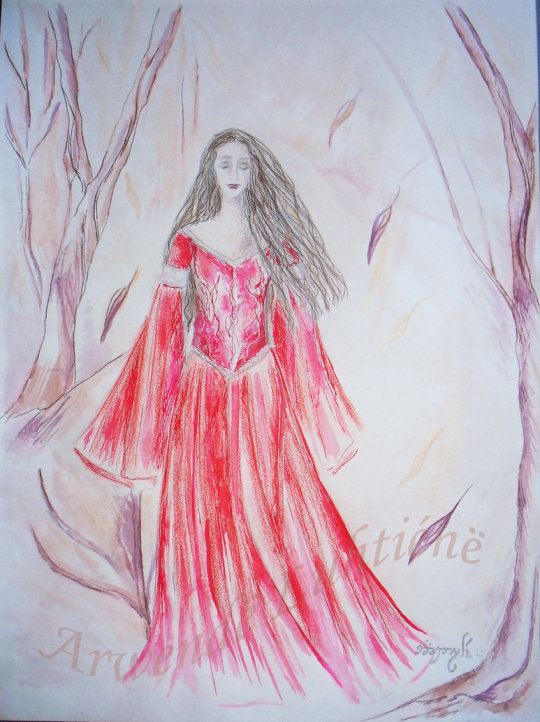
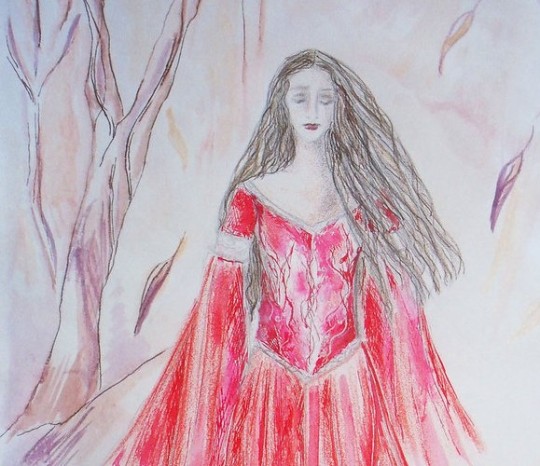


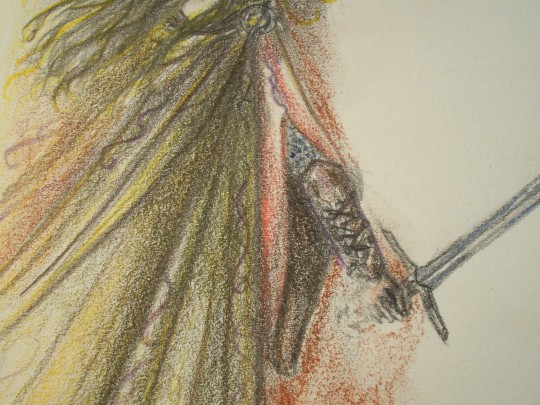
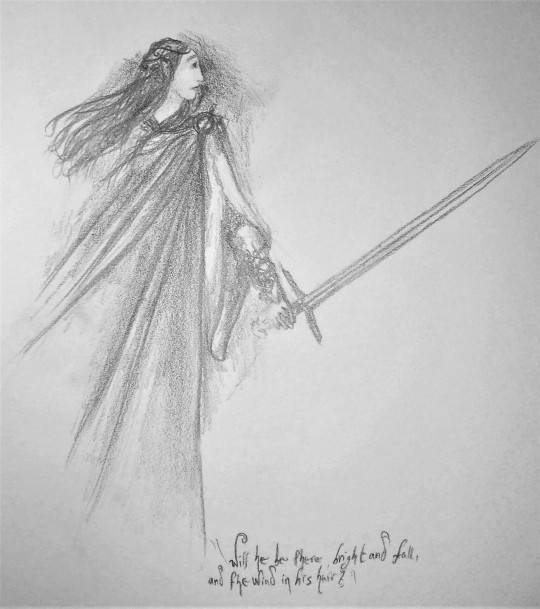
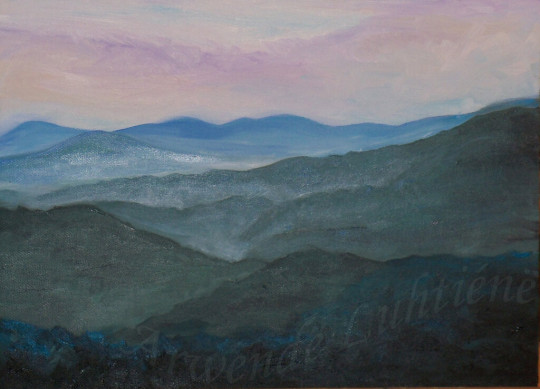
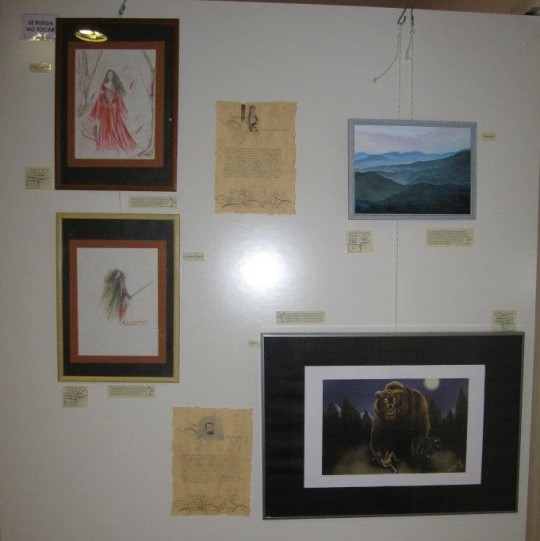
✨"Andreth's Lament" + Aegnor in the Dagor Bragollach, both from 2011 and sent as part of that year's art competition of the Spanish Tolkien Society. All works from this competition were part of a Tolkien art exhibition in Valencia, also featuring my oil painting of Dorthonion 😄 ✨
.
"I was young and I looked on his flame (...). He was young and his flame leaped towards me, but he turned away and he is young still (...) For one year, one day, of the flame I would have given all: kin, youth and hope itself."
.
Athrabeth Finrod ah Andreth, or "When one of Galadriel's younger brothers was a bit of an a-hole to a wise-woman of the House of Beor and then Finrod decided to major in patronizing human women ghosted by his brothers about life and love instead of getting his brother to give her a bit of closure and communication and not just leave", am I right 🙄😬🙃
.
Like, Aegnor leaves Andreth because the relationship isn't worth the heartbreak, and Finrod rationalizes this to Andreth to no end, but Lúthien and Arwen literally become mortal and die for their male human lovers (the ultimate sacrifices in love are the order of the day if you're a woman, apparently, even a half goddess 😕). Idril literally gave human husband Tuor a ticket to Valinor. And Mithrellas did ultimately leave, but stayed quite a while with Númenoréan Imrazôr and had children with him. So, gendered double standard much?! Thank the Valar Rings of Power gave us the very needed representation of Arondir actually being a decent person with Bronwyn and pursuing a serious relationship with her in respectful terms, because seriously 😐.
.
🎨ArtStation
🎨Instagram
🎨 DeviantArt
#andreth#aegnor#silmarillion#tolkien#tolkien art#tolkien fanart#silmarillion art#silmarillion fanart#lotr#andreth saelind#aikanáro#house of beor#house of finarfin#tolkien elves#tolkien elf#My art#noldor#history of middle earth#morgoth's ring#finrod#athrabeth finrod ah andreth#rings of power#arondir#bronwyn#luthien#idril#spanish tolkien society#sociedad tolkien española#tolkien women#arwen
25 notes
·
View notes
Note
So wait, is the myths transformed version of Melkor supposed to be canon?🤔 I always thought the Silmarillion was basically just a collection of the most finalized versions of the first age events, but reading up on Morgoth’s Ring it sounds as if what’s written in there is what was intended to be canon by Tolkien?
It's a tough question that only Tolkien could definitively answer. Christopher Tolkien states in the foreword of the Silmarillion:
"On my father’s death it fell to me to try to bring the work into publishable form. It became clear to me that to attempt to present, within the covers of a single book, the diversity of the materials – to show The Silmarillion as in truth a continuing and evolving creation extending over more than half a century – would in fact lead only to confusion and the submerging of what is essential. I set myself therefore to work out a single text, selecting and arranging in such a way as seemed to me to produce the most coherent and internally self-consistent narrative. In this work the concluding chapters (from the death of Túrin Turambar) introduced peculiar difficulties, in that they had remained unchanged for many years, and were in some respects in serious disharmony with more developed conceptions in other parts of the book."
"A complete consistency (either within the compass of The Silmarillion itself or between The Silmarillion and other published writings of my father’s) is not to be looked for, and could only be achieved, if at all, at heavy and needless cost."
Basically, Tolkien worked on this mythology for over half a century and, as anyone who has ever even thought about doing their own worldbuilding can already guess, changed his mind on a lot of things. Myths Transformed in particular contains some later writings of Tolkien and deals with some changes he envisioned, particularly in regards to the cosmology of Eä. Christopher writes:
"In this last section of [Morgoth's Ring] I give a number of late writings of my father's, various in nature but concerned with, broadly speaking, the reinterpretation of central elements in the 'mythology' (or legendarium as he called it) to accord with the imperatives of a greatly modified underlying conception."
(...)
"With their questionings, their certainties giving way to doubt, their contradictory resolutions, these writings are to be read with a sense of intellectual and imaginative stress in the face of such a dismantling and reconstitution, believed to be an inescapable necessity, but never to be achieved."
So what we can say for sure is that Tolkien wanted to make various changes, but a lot of things were never quite finalized or properly edited or compiled, which Christopher then tried to do.
Which one is more canon? I don't know and the one person who knew best has not been with us for many decades now. But what I would say is that it's completely valid to take the Silmarillion as a basis for canon and use the other writings and other versions - both earlier and later texts - to expand on canon however you see fit.
While it can be fun to examine the material and try to piece it together like Christopher did, I personally am a huge fan of people engaging with various texts in various different and unique ways; it's just important to be clear and honest about what was taken from which text and what is headcanon/fanon and not try to present one's own conclusions as the one true canon.
I know this is not really a clear answer and thus may be not as satisfying, but it's also cool to see how things like this evolve, no? :D
14 notes
·
View notes